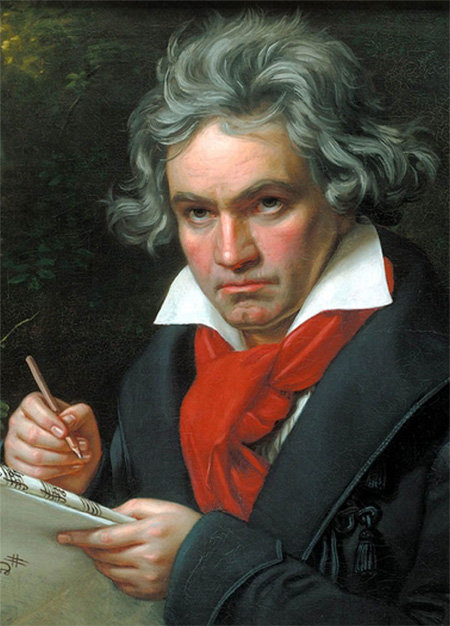Beethoven’s Symphony No. 5 holds spirit of French Revolution
Beethoven’s Symphony No. 5 holds spirit of French Revolution
Posted June. 30, 2020 07:48,
Updated June. 30, 2020 07:48




The Symphony No. 5 in C minor of Ludwig van Beethoven is one of his most representative works, which marks the 250th anniversary since its composition this year. It is a monumental piece throughout the entire history of symphonies.
The first movement of the symphony starts with a fierce motif composed of three notes in a row.
Though it is a coincidence, three dots and a dash in Marso code means the letter “V,” which is the number “five” in the Roman numerals and the first letter of the word “victory.”
The Symphony No. 5 in C minor is also known as “Destiny Symphony,” based on an anecdote shared posthumously by Anton Schindler, Beethoven’s secretary, that the German composer pointed at the score and said, “This is the sound of fate knocking at the door.” However, as Schindler made up multiple stories and fabricated the record written by Beethoven to converse with others by writing most do not believe him.
“Beethoven’s Symphony No. 5 is not a symphony of destiny or anything else – it literally is an ‘allegro con brio,’ or a fast allegro, as written on the score,” legendary conductor Arturo Toscanini said. Then, is there any special meaning behind the three-note motif of the symphony?
John Eliot Gardiner, a British conductor and musicologist, claims that the motif has a different meaning, not “destiny.” He says the first movement of the symphony was originated from a song of the French Revolution supporters. “Hymne du Panthéon” of Luigi Cherubini, a composer during the French Revolution period, has the song. The song that features a three-note motif in a fast tempo sounds very similar to the first movement of Beethoven’s Symphony No. 5.
Beethoven was born in Bonn near the Rhine River in Germany, which is close to the Netherlands and France. The place was also experiencing the spirit of the French Enlightenment and Revolution. The ideology of “liberty, equality, and fraternity” captured the German genius’ mind. Though he always enjoyed the patronage of the noble, he believed the artist is a teacher of humanity who is superior to the noble. Before Napoleon Bonaparte became the emperor of France, Beethoven was favorable to the country that overthrew the monarchy and wanted to dedicate the Symphony No. 3, which later became known as the “symphony of a hero,” to the French emperor under the title of the “Bonaparte symphony.” Although he turned away from Napoleon as the French became the emperor and invaded neighboring countries, the German composer never turned away from the ideology of “liberty, equality, and fraternity.”
The environment surrounding Beethoven might have been his destiny, but he lived his life with superhuman-like willpower to twist the arm of the destiny to overcome it. Such a way of his life is closely related to not only his innate nature or the process of personal perseverance to overcome his hearing impairment and become a successful composer, but also the turbulent period of his times. Such an understanding will make the Symphony No. 5 sound different, beyond its nickname, “Destiny Symphony.”
The Seoul Philharmonic Orchestra will play Beethoven’s Symphony No. 5 and Leonore Overture No. 3, which was composed as an overture of an opera titled “Fidelio,” under the command of principal guest conductor Markus Stenz as part of the orchestra’s regular performance on July 3 and 4 at the Lotte Concert Hall in Seoul.
gustav@donga.com
Headline News
- Conflict mounts over removing rebellion crime from impeachment bill
- 55 percent of Seocho apartment transactions in October involved property gifting
- Richer people live up to nine more healthy lives
- Zelenskyy claims N. Korean troops lost heavy casualties in Kursk
- Man City secures 2 consecutive wins with Haaland leading the charge







